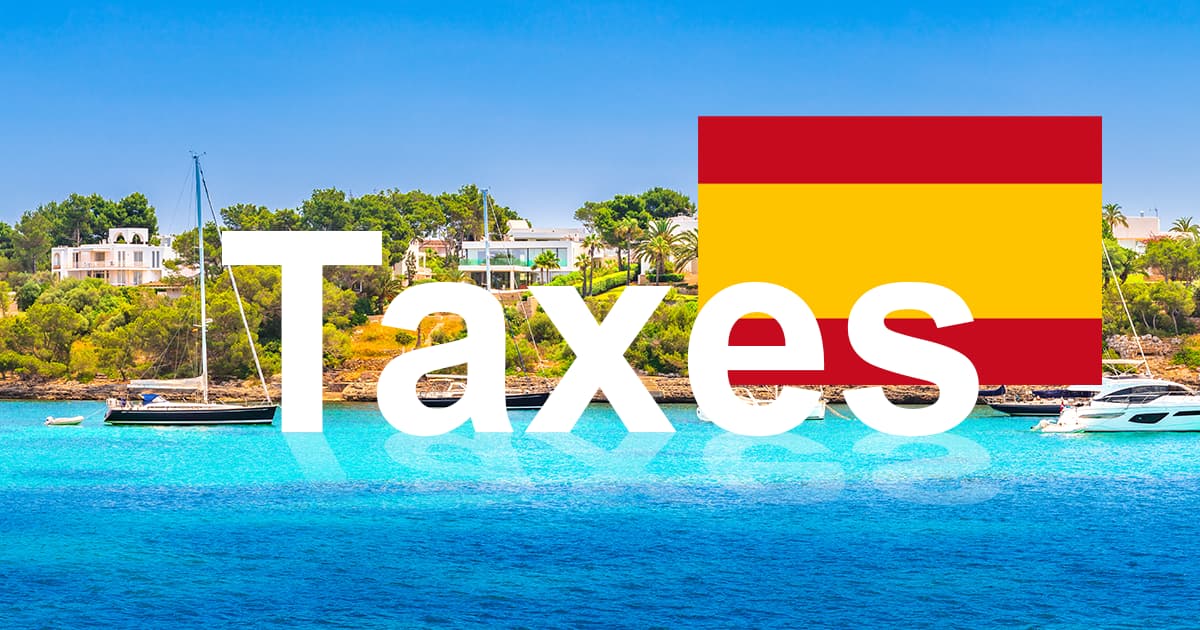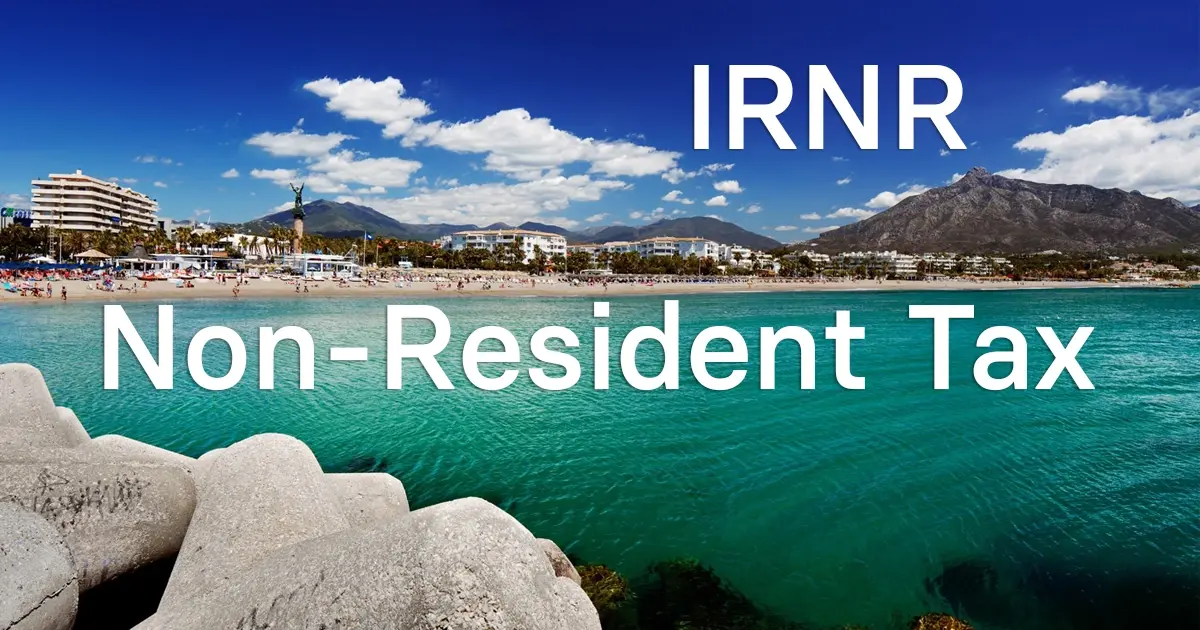
IBI Property Tax in Spain: What Foreign Owners Must Know in 2025
Last update: September 3, 2025
Reading time: 15.2 min
No Time to Read It All? Here’s the Quick Summary:
The IBI (Impuesto sobre Bienes Inmuebles) is an annual municipal property tax in Spain, based on the cadastral value — not the market price. All property owners, residents and non-residents alike, must pay it. Rates typically range from 0.4% to 1.1%, depending on the property type and municipality. The legal taxpayer is the owner as of January 1st each year. IBI is paid once per year, usually between May and October, via bank transfer, online portals, or direct debit. Non-payment leads to fines, interest, or enforcement actions. Foreign owners should appoint a fiscal representative and may benefit from local discounts.
What Is the IBI Tax in Spain?
The IBI tax (Impuesto sobre Bienes Inmuebles) is Spain’s annual property tax, paid by all property owners — regardless of whether they are Spanish residents or foreign non-residents. It is a municipal tax levied by the local town hall (Ayuntamiento) and applies to both urban and rural properties.
If you own a flat, house, land, garage, or commercial space in Spain, you are required to pay IBI once per year. The amount is based on the cadastral value (valor catastral) of the property — a figure set by the tax authorities that is typically much lower than the market value.
Who Has to Pay IBI?
Whether you’re a Spanish citizen, a foreign buyer, a long-term investor, or a seasonal homeowner, you’re legally obligated to pay IBI as long as you are the registered property owner as of January 1st of the tax year. This includes:
- Spanish residents and non-residents
- Companies or legal entities owning real estate in Spain
- Heirs or beneficiaries of inherited property
If a property changes hands during the year, the seller is technically responsible for that year’s IBI, but buyers and sellers often agree to split the bill proportionally in the sales contract.
How IBI Differs from Other Spanish Property Taxes
It’s easy to confuse IBI with other property-related taxes in Spain, especially for foreign owners. Here’s how it differs:
- IBI: A yearly municipal tax based on cadastral value. Applies to all owned properties.
- IRNR: A non-resident income tax, even for properties not rented out. Paid annually by non-residents.
- AJD: A stamp duty paid once when purchasing a new-build property.
- ITP or VAT: One-time taxes paid at the moment of purchase (resale or new-build respectively).
- Plusvalía Municipal: A local capital gains tax paid when selling a property, based on land value appreciation.
In short, IBI is the only recurring local tax that every property owner in Spain must pay, making it essential to understand and track — especially for foreign owners who don’t live in Spain full-time.
How Is IBI Calculated?
The IBI tax in Spain is calculated based on the property’s cadastral value (valor catastral) — a government-assigned value that is typically 30% to 60% lower than the market price. This cadastral value is determined by the Dirección General del Catastro, a branch of the Spanish tax agency, and serves as the tax base for several local charges.
What Is the Cadastral Value?
The valor catastral takes into account:
- Size and surface area of the property (including built and usable space)
- Location — central, rural, or coastal zones influence the value
- Property use — residential, commercial, industrial, agricultural, etc.
- Construction quality and condition
- Municipal development and public services (e.g. nearby roads, utilities)
Cadastral values are updated periodically — sometimes after a revision of local urban planning or infrastructure — and do not reflect market trends directly. However, if you renovate your home or build an extension, the cadastral value (and your IBI bill) may increase after reassessment.
You can check your property’s cadastral value on your previous IBI bill or via the Catastro website using your reference number.
What Is the Typical IBI Rate?
The IBI tax rate ranges from 0.4% to 1.1% of the cadastral value, depending on the type of property and the municipality.
- Urban properties (most homes and apartments): 0.4% – 1.1%
- Rural properties (land, agricultural buildings): 0.3% – 0.9%
Each town hall (Ayuntamiento) sets its own rate within these national limits. For example:
- In Madrid, rates are around 0.51%
- In Barcelona, typically 0.75%
- In smaller towns, it can be lower — around 0.45%
The IBI rate can also vary depending on whether the property is a primary residence, vacant, or used commercially.
Example Calculation
Let’s say your flat in Valencia has a cadastral value of €100,000 and the local IBI rate is 0.75%:
IBI owed = €100,000 × 0.75% = €750 per year
This means that even if the market value of your home is €250,000, you’ll only pay IBI based on the lower cadastral value.
When and How Is IBI Paid?
The IBI tax in Spain is paid annually, with payment periods typically falling between May and October, depending on the municipality. While the tax amount is determined at the start of each year, town halls (Ayuntamientos) define the exact payment deadlines and methods for their local area.
When Do You Pay IBI?
- IBI is due once per year, usually in the second or third quarter
- Most municipalities issue the bill between May and September, with a deadline typically in October
- Some localities allow early payment discounts if you pay in the first few months of the year
- Late payment penalties apply if you miss the deadline, including interest and possible fines
You should always check the official calendar of your local Ayuntamiento to confirm the applicable dates for your property.
How Do You Receive Your IBI Bill?
Property owners receive the bill:
- By postal mail, sent to the address registered with the municipality
- By email or online notification, if you’ve signed up for electronic correspondence
- In some cases, your lawyer or fiscal representative may receive it on your behalf
If you’re a non-resident or rarely in Spain, it’s highly recommended to set up a digital notification system or assign a local gestor to avoid missed deadlines.
Payment Options
IBI can be paid using various methods, including:
- Online payment through your local council’s website
- In person at your town hall or authorized local bank branches
- By direct debit (domiciliación bancaria), which ensures automatic yearly payment from your Spanish bank account — highly recommended for non-residents
Setting up direct debit typically requires:
- A Spanish bank account
- Completing a short form (often online or at the town hall)
- Providing your NIE and cadastral reference number
Where to Pay IBI
The payment is always made to the municipal tax office. Depending on the locality, you can:
- Pay online via the Ayuntamiento’s website
- Pay in person at a municipal office or collaborating bank
- Request payment support through a gestor or property manager
Tip: If you’ve just bought your property, make sure the ownership change is updated at the Catastro and local tax office, so future IBI bills are correctly issued in your name.
Who Is Responsible for Paying IBI?
Understanding who pays the IBI tax is essential for both buyers and sellers of property in Spain. The rules are clear from a legal standpoint, but private agreements can sometimes shift the responsibility.
Legal Responsibility: Owner on January 1st
According to Spanish tax law, the person listed as the legal owner on January 1st of the tax year is legally responsible for paying the full IBI tax for that year — regardless of whether the property is sold, gifted, or inherited during the following months.
Example:
If you sell your property in March 2025, you are still responsible for the entire 2025 IBI bill, because you were the registered owner on January 1st.
Buyer-Seller Agreements: A Common Exception
While the law assigns the tax to the owner as of January 1st, it’s very common in real estate transactions for buyers and sellers to negotiate a split of the IBI costs for the year of sale.
This is usually agreed:
- In the private purchase contract (contrato de arras) or
- In the deed of sale (escritura pública)
Split arrangements are often pro rata — meaning each party pays for the number of months they owned the property that year. However, this is a private agreement, not binding for the tax office. If the seller doesn’t pay, the buyer may still be required to cover the full amount to avoid fines, and then seek reimbursement via legal channels.
IBI in Case of Inheritance or Gifts
If the property is inherited or transferred as a gift:
- The heirs or recipient become responsible for IBI from the next tax year
- The original owner or their estate remains liable for the tax in the year of transfer, based on the January 1st rule
In these cases, it’s important to update the property registry (Registro de la Propiedad) and cadastral records (Catastro) quickly to avoid billing errors or penalties.
Consequences of Not Paying IBI
Failing to pay your IBI (Impuesto sobre Bienes Inmuebles) can lead to more than just small penalties. Since IBI is a municipal tax, your local town hall (Ayuntamiento) has strong enforcement powers — including property seizure in extreme cases.
Fines and Late Payment Interest
If you miss the IBI payment deadline (typically between May and October), the local authority will begin applying:
- Surcharges:
- 5% for early voluntary payment
- 10% for payment after the due date
- 20% if the tax enters the enforcement phase (plus late interest)
- Interest on arrears: Applied daily until the debt is cleared
These amounts accumulate quickly, making it expensive to delay even by a few weeks.
Enforcement by the Local Council
If the tax remains unpaid after multiple notices, the Ayuntamiento can initiate enforcement proceedings (vía ejecutiva), which may include:
- Direct withdrawals from your Spanish bank account
- Seizure of wages (for residents)
- Placement of a lien on the property (embargo)
The unpaid debt becomes a charge on the property, and must be cleared before it can be sold or transferred.
Risk of Property Auction (Subasta)
In rare but serious cases, especially for non-resident foreign owners who ignore tax debts for years, the local government may:
- Embargo the property
- List it for public auction (subasta pública) to recover the unpaid IBI
While this is a last resort, it is legally permitted and has occurred — particularly in tourist zones and coastal areas.
How to Regularize Your IBI Situation
If you realize you’ve missed a payment:
- Contact your Ayuntamiento or visit their website
- Request a copy of your unpaid IBI bill
- Settle the debt, including surcharges and interest
- Consider setting up direct debit to avoid future delays
If several years of IBI are overdue, you can often negotiate a payment plan (aplazamiento o fraccionamiento) with the town hall.
How to Check and Manage Your IBI as a Foreign Owner
Owning property in Spain as a non-resident comes with specific administrative responsibilities — and IBI (Impuesto sobre Bienes Inmuebles) is one of the most important. Managing it properly avoids penalties and ensures compliance with local tax laws.
How to Request Your Cadastral Value
The cadastral value (valor catastral) is the foundation of your IBI bill. It’s a government-assessed value, typically lower than the market price, based on:
- Size and age of the property
- Location and urban classification
- Construction materials and permitted usage
To check it:
- Visit the official Catastro website using your NIE and property reference
- Or request it via your local Ayuntamiento (town hall)
It is usually shown on previous IBI bills or official property deeds (escritura pública).
Set Up Automatic Reminders or Direct Debit
As a foreign owner, especially if you’re not living in Spain year-round, it’s easy to miss your IBI deadline. To avoid that:
- Set calendar alerts for the IBI payment window (typically May–October)
- Or authorize a direct debit (domiciliación bancaria) through your Spanish bank or town hall
Some local councils offer discounts (up to 5%) for choosing auto-debit.
Appoint a Fiscal Representative
If you’re not a Spanish tax resident, appointing a fiscal representative is highly recommended — and often legally required.
They can:
- Monitor and manage your IBI payments
- Receive tax notifications on your behalf
- Handle communication with local tax authorities
This ensures you stay compliant even when abroad, and avoids surprises due to missed notices or language barriers.
Check for Local IBI Discounts
Certain municipalities offer IBI reductions for qualifying owners. These may apply if:
- The property is your primary residence
- You’re part of a large family (familia numerosa)
- The property has eco-friendly certifications or energy efficiency measures
- You meet age or disability criteria
Discounts vary widely, so ask your local Ayuntamiento or legal advisor if you qualify.
Real IBI Examples and Ranges
While the IBI tax is based on the cadastral value, most foreign property owners want a real-world estimate of what they might pay annually. Below are typical IBI figures across Spain based on property type, size, and location — to help you budget more accurately.
Real-Life Examples
90 m² apartment in central Valencia
Cadastral value: approx. €50,000
IBI rate: 0.8%
Annual IBI: ~€400
Detached villa in a coastal area of Málaga province
Cadastral value: approx. €120,000
IBI rate: 0.75%
Annual IBI: ~€900
These amounts can vary widely depending on the property’s age, location, and updates to cadastral values by the local government.
| Property Type | Location | Typical IBI Range |
|---|---|---|
| 1-bedroom apartment (60–70 m²) | Madrid, Barcelona | €250 – €500 |
| 2-bedroom apartment (80–90 m²) | Valencia, Seville | €350 – €600 |
| Semi-detached house (100–120 m²) | Alicante, Málaga | €600 – €850 |
| Detached villa (150–200 m²) | Costa Blanca, Costa del Sol | €800 – €1,200+ |
Location: Madrid, Barcelona
IBI: €250 – €500
Location: Valencia, Seville
IBI: €350 – €600
Location: Alicante, Málaga
IBI: €600 – €850
Location: Costa Blanca, Costa del Sol
IBI: €800 – €1,200+
Source : Agencia Tributaria
Not sure how much IBI you’ll pay on your future home?
Try our property tax simulator or contact our team for a free IBI estimation.
IBI vs Other Spanish Property Taxes
Understanding how IBI compares to other property-related taxes in Spain helps avoid confusion — especially for foreign property owners.
IBI vs IRNR: The Ongoing Tax Duo for Non-Residents
IBI (Impuesto sobre Bienes Inmuebles) is a municipal property tax paid annually by all property owners, whether they are residents or non-residents.
In contrast, IRNR (Impuesto sobre la Renta de No Residentes) is a state income tax applied to non-residents who own property in Spain. Even if the property is not rented out, non-residents must still pay IRNR on a deemed rental income.
Key difference:
- IBI is based on the cadastral value and collected by the local town hall
- IRNR is based on deemed or actual income and paid to the national tax agency
🔗 More on IRNR: Non-Resident Tax (IRNR) in Spain (Coming soon)
IBI vs Plusvalía Municipal: Annual vs Transaction-Based
While IBI is paid every year, Plusvalía Municipal (formally called IIVTNU) is only due when you sell, inherit, or gift a property.
It is a local tax on the increase in land value since the last ownership transfer. The seller usually pays it upon sale, but in gifts or inheritance, the recipient may be liable.
Summary:
- IBI = Recurring annual cost for all property owners
- IRNR = Annual income tax for non-resident owners
- Plusvalía = One-time local tax triggered by property transfers
This distinction is key to planning both your yearly budget and your exit strategy when you decide to sell.
How SpainEasy Support Can Help
Managing your IBI obligations from abroad can be complex — especially if you don’t speak Spanish or don’t have access to local systems. SpainEasy Support provides personalized assistance to help you stay compliant and avoid costly mistakes.
We Retrieve Your Cadastral Information
Not sure what your property’s cadastral value is or how much IBI you owe? We can access the Catastro database or request the necessary details from your local Ayuntamiento on your behalf.
We Help You Set Up Payments and Avoid Penalties
We can assist with:
- Enrolling your property in auto-debit systems
- Setting annual reminders before the payment deadline
- Paying on your behalf if you don’t have a Spanish bank account
We Act as Your Local Tax Representative
If you’re a non-resident, appointing a local fiscal representative is highly recommended. Our team can:
- Represent you with your local municipality
- Receive notices or bills on your behalf
- Handle discount requests or disputes with the tax office
Need help with your IBI? Get expert support now
More In-Depth Tax Guides for Foreign Property Owners in Spain
Want to explore a specific tax in more detail? These expert guides break down the most important property-related taxes in Spain — with clear explanations, examples, and procedures tailored for foreign owners:
Taxes When Purchasing Real Estate in Spain
A detailed breakdown of all upfront taxes and fees, including ITP, VAT, AJD, notary and legal costs — with examples and regional comparisons.
Non-Resident Tax (IRNR) in Spain
Whether you rent your property or not, if you’re not a Spanish tax resident, you must file IRNR. This guide covers tax rates, deadlines, and how to file Modelo 210 from abroad.
Capital Gains Tax When Selling Property in Spain
Selling a home? Understand the full tax implications — from national capital gains tax (IRPF/IRNR) to the local Plusvalía Municipal. Includes tax rates, exemptions, and refund processes.
Real Estate Taxes in Spain: What Every Foreign Buyer Should Know
Our complete overview of all real estate taxes in Spain — from purchase to resale. Ideal if you’re just getting started or want to make sure you’re compliant at every step.








